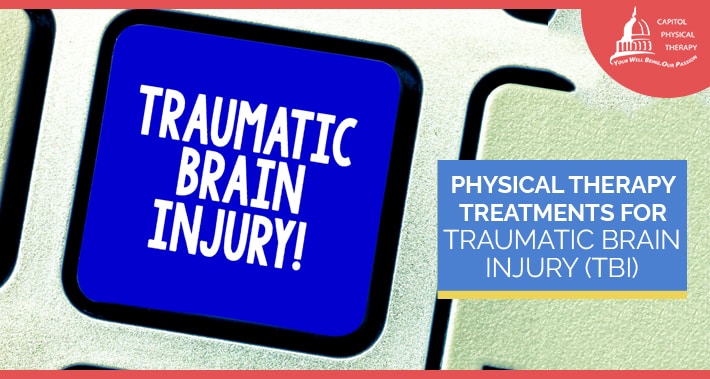
A traumatic brain injury is a serious condition that can negatively impact both your physical and emotional wellbeing.
Your brain plays a role in everything you do.
Whether it’s complex mental tasks like solving a puzzle, or coordinating simple movements like those required for walking, yoga, pilates or various outdoor activities.
Your brain is the control center of your body.
When something happens that disrupts your brain’s functions, it can lead to significant impairments that considerably impact your quality of life.
An estimated 1.5 million Americans suffer a traumatic brain injury annually, and our physical therapists will work with you to help manage your symptoms and provide treatment.
Keep reading to learn more about traumatic brain injuries, and how brain injury rehabilitation in DC can help in your path to recovery.
What Is A Traumatic Brain Injury?
Traumatic brain injuries are the result of trauma to the head.
There are numerous types of traumatic brain injuries and they differ in their severity and their impact on your brain.
When you suffer an injury in a traumatic brain injury, force gets applied to your brain tissue, which can disrupt your brain’s functions.
Traumatic brain injuries often occur after falls, car crashes, or direct blows to the head.
The most common type of traumatic brain injury is a concussion.
RELATED: Physical Therapy Treatments For Concussions.
Other types of traumatic brain injury can include:
You may experience frequent headaches as a result of a traumatic brain injury.
Traumatic brain injuries can happen to anyone, however, certain groups are more at risk.
These can include:
- Children under the age of 4, usually due to injury from falls or child abuse
- Adolescents aged 15 to 19, usually due to sports injuries or car crashes
- Seniors aged 75 and up
- Those who have experienced whiplash from an accident
Furthermore, those who are above 50 may be more susceptible to traumatic brain injuries if they suffer from conditions such as:
- Diabetes
- Neurological issues
- Stroke
- Huntington’s disease
- Lung conditions
- Heart conditions
- Obesity
- Pregnancy
Falling is common in those with Parkinson’s disease and those suffering from balance issues.
Seniors often deal with slips and falls as a result of the following conditions as well:
- Multiple sclerosis
- A stroke
- Osteoporosis, which can cause kyphosis
- Osteoarthritis
RELATED: Physical Therapy For Seniors Health Issues
What Are The Symptoms Of A Traumatic Brain Injury?
The symptoms of traumatic brain injury differ widely among people.
The type of traumatic brain injury, the age of the person with the injury, and a number of other factors determine these differences.
Physical symptoms of traumatic brain injury may include:
- Weakness/difficulty moving limbs, body, and head
- Sleep issues
- Difficulty sitting
- Difficulty standing
- Difficulty balancing
- Difficulty walking (physical therapy gait training can help)
- Shoulder pain
- Neck or back pain
- Difficulty laying down or changing positions in bed
- Chronic pain (chronic pain physical therapy can help)
Cognitive symptoms of traumatic brain injury may include:
- Difficulty remembering
- Difficulty paying attention
- Difficulty problem solving
- Reduced awareness of these difficulties, resulting in safety concerns
Sensory symptoms of traumatic brain injury may include:
- Changes in vision, such as double vision
- Changes in hearing
- Changes in sense of touch
- Changes in balance
Emotional and behavioral symptoms of traumatic brain injury may include:
- Difficulty controlling emotions
- Changes in personality
- Inability to understand what is happening, resulting in emotional distress
Recovering from and managing your symptoms from a traumatic brain injury requires time and commitment to your treatment plan.
You may require accommodations at work during your treatment, such as ergonomic changes to make you more comfortable.
How To Diagnose Traumatic brain Injury
Seek immediate emergency care if you suspect that you or a loved one is suffering from a traumatic brain injury.
Any level of trauma may cause significant damage.
Dealing with confusion or headaches after a concussion are some early signs of a traumatic brain injury.
Is better to err on the side of caution and seek treatment, even if the symptoms are mild.
Assessing the severity of a traumatic brain injury can include diagnostic tests that evaluate your visual, speech, and mobility responses.
Equipment, such as an MRI or CT scan, may be used to determine which part of your brain is injured, and whether there is any bleeding or fluid present.
A physical therapist will often work with your medical team to understand what parts of your brain are injured, and to focus therapy on those areas.
Physical Therapy Treatments For Traumatic Brain Injury
Your physical therapist will work with you, as well as your family and other health care providers, to develop a treatment plan that is unique to your needs and limitations.
The type of treatment plan depends on a variety of factors, such as your level of consciousness and the severity of your injury.

1. Physical Therapy For TBI In A Vegetative State
Vegetative state occurs in severe cases of traumatic brain injury.
In these cases, you can perform some basic brain functions, such as opening your eyes on a regular sleep and wake schedule and breathing, but you remain unaware of all surrounding activity.
Your physical therapist will help you with equipment use and proper posture and flexibility to make sure you don’t develop bed sores, as well as encourage you to respond to your environment.
2. Physical Therapy For TBI In A Minimally Conscious State
If you are in a minimally conscious state, you are beginning to show signs of awareness, though your responses may not be consistent.
In this case, your physical therapist will help with stretching, positioning, and equipment use, while also working with you to increase communication and consistent responses to commands.
3. Physical Therapy For TBI In A Fully Conscious State
If you are in a fully conscious state, your physical therapist will help you with physical exercise, task specific training, and patient and family education.
Your physical therapist can help you improve many symptoms, including:
- Alertness and responsiveness
- Muscle and joint flexibility
- Movement in bed, sitting without support, and standing up
- Balancing while sitting, standing, walking, and coordination
- Strength and energy, reducing feelings of fatigue caused by inactivity or the brain injury itself
- Return to sports and running
If needed, your physical therapist can also help you learn how to use equipment, such as an ankle brace, walker, or wheelchair.
If you undergo surgery for a traumatic brain injury, you may require physical therapy for surgery recovery.
Preventing Traumatic Brain Injury
Traumatic brain injuries are often preventable.
It’s important that you take steps to protect your head when taking part in any risky activities.
It’s also important to be aware of the signs and symptoms of a traumatic brain injury, so that you can seek immediate medical attention should it occur.
Some additional steps you can take to prevent traumatic brain injury include:
- Wearing a helmet when taking part in activities that have a risk of falling
- Always using seatbelt when driving, and secure infants in an appropriate car seat
- Supervising children playing in fall prone areas like playgrounds
- Putting up child proof barriers in your home
- Educating adolescents about the factors associated with brain injury in car crashes, such as alcohol, speeding, and texting while driving
- Educating adolescents about concussions or severe sport injuries
- Educating seniors about the risks of falls in home due to activities such as ladder climbing, vacuuming stairs, and walking on wet floors
Book Your Appointment With Capitol Physical Therapy Today
It can be scary and overwhelming if you or a loved one have experienced a traumatic brain injury.
Living with a traumatic brain injury can be challenging, but you don’t have to go through it alone.
At Capitol Physical Therapy, our qualified physical therapists can help you manage your symptoms and offer treatment for a traumatic brain injury.
Book your appointment with Capitol Physical Therapy today.
1331 H St NW #200,
Washington, DC 20005
- https://g.page/capitolptdc
9560 Pennsylvania Ave. # 202,
Upper Marlboro, MD 20772
- https://goo.gl/maps/zjL4NnnuThRhrcS86
Capitol Physical Therapy offers orthopedic and other pain related solutions, with our versitile team of physical therapists in Washington, DC